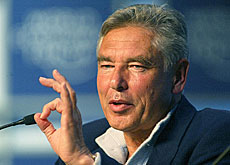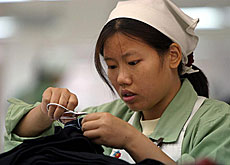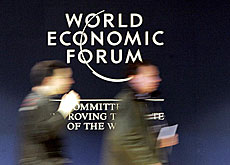Nestlé unfazed by change in South America

The head of Swiss multinational Nestlé says he sees the emergence of the political left in South America as an opportunity rather than a risk for the company.
Peter Brabeck, who is co-chairing the annual meeting of the World Economic Forum in Davos, says the Vevey-based group is currently enjoying a golden period in the region.
Galvanised by the rise to power of Hugo Chavez in Venezuela, the political left has been making important gains across South America.
Former coca farmer Evo Morales was sworn in as Bolivia’s first indigenous president at the weekend, and last week socialist Michelle Bachelet became Chile’s first woman president. Brabeck was there to witness her election victory.
swissinfo: You have just returned from Chile. How do you view political developments in South America?
Peter Brabeck: It’s a fairly interesting development – one that this time started in the north. Up until now, political change in Latin America has usually originated in the south. This time, it was in Venezuela where the shift first had a major impact.
We are now seeing a general political tendency towards leftwing governments. But that is not the whole story: these are much more populist governments than we have seen in the past. And this will certainly have an impact on the development of these countries.
swissinfo: How important is Latin America to Nestlé?
P.B.: This zone accounts for around seven to eight per cent of our turnover.
swissinfo: Does this big lurch to the left carry any concerns for Nestlé?
P.B.: Listen, Nestlé has been active in Latin America for 140 years. We have factories there and have been producing goods in these countries for more than 80 years. We are there to serve the people.
We have lived through Marxist governments and we are even active in Cuba. The political bent of those in power has never forced Nestlé to change its policy towards a continent where there is very significant development potential.
swissinfo: Have you drawn up scenarios or set up working groups to take account of the way the wind is blowing in South America?
P.B.: I am just back from Latin America because I wanted to be there for the presidential election in Chile, which was a fairly significant event.
At the same time, we invited to Chile all the Nestlé heads for Argentina, Peru, Bolivia, Paraguay and Uruguay.
We are constantly in touch with this continent, through our people on the ground and also through our director for Latin America. We follow developments very closely indeed.
swissinfo-interview: Pierre-François Besson in Davos
Nestlé is the world’s number one food and beverage company.
Founded in 1866, the group is based in Vevey, canton Vaud.
Turnover in 2004 was SFr87 billion, of which 7-8% was made in Latin America.
The group employs 247,000 staff worldwide.
Brabeck, who is both chairman and chief executive of Nestlé, is co-chairing the 36th annual meeting of the World Economic Forum in Davos.
He says there is a pressing need for leaders to address the growing water shortage in many regions. He also believes the issue of nuclear power needs to be addressed in the face of a possible energy shock.

In compliance with the JTI standards
More: SWI swissinfo.ch certified by the Journalism Trust Initiative


You can find an overview of ongoing debates with our journalists here . Please join us!
If you want to start a conversation about a topic raised in this article or want to report factual errors, email us at english@swissinfo.ch.